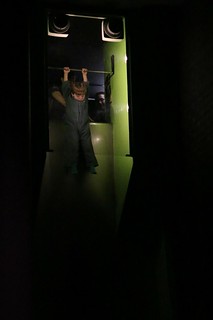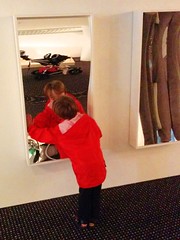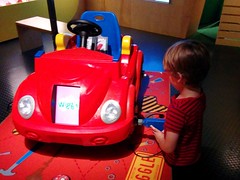If Alex Kidman can get a Lifehacker article out of a last minute passport application, I can get a blog entry.
I’ve had cause to apply for too many Australian passports in the last couple of years (mine and both of my children), and lo, I come to share my wisdom.
The online form
The passport office has an online version of the application form you can fill in. My advice: unless you are eligible for an renewal, do not bother with the online passport form.
All the online form does is generate a document you need to print out and take to a post office and it’s almost impossible to get the printer settings right to the point where I’m yet to meet anyone who actually has done so (apparently the passport office is very picky about it being printed in exactly the right size, in a way that printer drivers just don’t support). Plus, as Ruth Ellison noted in 2008 (and it looks like the website has not been redone since), the user experience is dreadful. Instead, go to the post office, pick up a paper application form, take it away and fill it out. And this is coming from someone who hand-writes so seldom she can’t reliably replicate her own signature any more, so you know I’m serious.
Actually, grab two forms, because they’re also fussy about any mistakes you make on it and it might be better to just complete a second form if you make one. (When I say “they”, it’s actually not clear if the passport office is incredibly fussy or if the post offices are overcautious on their behalf. But it doesn’t matter to you, normally. Someone is fussy.)
If you are renewing, it generates a single page form for you to sign. This is more reasonable to print. Make sure when you print it that no part of the form has been cut off at the edges of the paper and this seems to suffice. The alternative is calling the passport office and they will print this form for you and mail it to you.
Passport timelines
The Australian Passport Office is pretty good about its timelines (10 working days for a normal application, 2 if you pay an additional priority fee of roughly 50% of the cost of a normal application), but the trick is they do not include Australia Post’s part of the process. That is, they do not include the time taken for the application to be transported to them, nor the time Australia Post takes to deliver it back to you. The delivery is especially tricky because they mail it to you registered post at your residential address. Registered post is delivered to people, not mailboxes, so unless you tend to be home all day, you will miss the delivery and need to pick up from a post office, probably the next day.
So, you can read their processing time something like this:
Normal application They say 10 working days or less. However, apply at least three weeks and ideally more before you need the document if you want to receive it in the post. If it’s a near thing, pay the priority fee or, if you live near a passport office, ask the post office to mark it as for collection at the passport office, and they ring you and you go and pick it up there the day it is ready rather than having it take multiple days in the post. (Source: my husband did a normal application with passport office pickup in March 2013.)
Priority application They say 2 days. But the post office’s part takes at least that long again. I can tell you from hard-won personal experience this week that the post office did not consider 5 business days enough time for me to get one through applying through them, and that’s in Sydney where it’s only one day to deliver it to the passport office. So this is really more “dammit, just missed the 10 days cutoff” option than the “I’m travelling within the week!” option.
“But I am travelling within the week!” You need to book a passport interview at a capital city passport office, where they will take your documents and start your 2 working day countdown that second. Ring the passport office, eventually if you are patient with their phone tree you get through to an operator who will make you an appointment. You will get a passport 2 working days after that appointment. (The Passport Office is quite strict with themselves about working days. I did a passport interview Thursday, I have a receipt saying my passport is due for completion at 11:44am Monday!) I was told if your appointment is within those 2 working days to spare you may get promised one faster at the discretion of the passport officer who interviews you, but no promises at the time of booking.
However, again from hard-won personal experience, they could have a two or three day wait for an appointment, which puts you pretty much back at the post office’s timeline. Call them back daily to see if a slot has opened up: I originally had an appointment on Friday afternoon having been assured that Wednesday and Thursday were booked solid, but when I rang on Thursday morning they had an appointment available within two hours.
“But I’m travelling within the day!” Read Alex Kidman’s article. It sounds like the process is to turn up sans appointment and have at least one of a very pressing need or a very apologetic approach to them, and they may give you a slot freed by a no-show and can produce a passport within the day in some cases. Whirlpool, which you can usually rely upon to contain a gloomy bunch of know-it-alls looking forward to explaining how you’ve stuffed it all up, also has largely positive stories.
Proving citizenship
There are no hacks, this is a total pain in the butt and seems capable of holding up passport applications for years or forever.
I luckily have the most clear-cut claim: I was born in Australia before 20 August 1986, I have citizenship by right of birth alone. But even one of my children, who has the super-normal case of citizenship by right of Australian birth combined with two citizen parents at the time of his birth, had one set of documents rejected (incorrectly, in my opinion, but I don’t award passports). Ruth Ellison, a naturalised citizen, writes that she needed to add time to get documentation that was in her parents’ possession. Chally Kacelnik, after digging up evidence of her mother’s permanent residency at the time of her birth, still faced pushback as to its status. A Whirlpool poster, estranged from their parents and therefore unable to get them to provide documents proving their citizenship, seemed unable to prove citizenship by descent as of the end of their thread despite living in Australia their whole life.
I have the very limited consolation of a slight acquaintance with other country’s processes fairly recently and can report that they are often just as reliant on hoping that someone in the family is the type of person who flees countries with a complete set of personal identity documents and someone else who keeps a stash of passports belonging to people who’ve since died, and so on. That is, no consolation.
Updates January 2018:
There is now a truly online passport application for adults, with the post office doing identity verification rather than accepting entire printed forms for lodgement. I have no experience of this application method, but expect it is an improvement.
The Department of Home Affairs provides a Evidence of Australian Citizenship document to those whose claim to Australian citizenship is not one of the more obvious routes.















